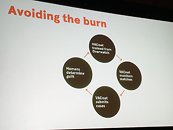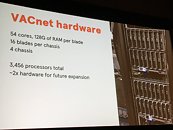Wednesday, March 28th 2018

Valve Uses over 1,700 CPUs to Catch CS:GO Cheaters
Valve was one of the first to run a centralized game distribution + multiplayer service, through Steam, and its in-house alternative to the Punkbuster anti-cheating software, in the form of VAC (Valve Anti-Cheating). Over the years, VAC has evolved to leverage newer technologies. Its latest avatar is VACnet, an AI deep-learning system built up of over 1,700 CPUs, to more intelligently sniff out cheaters. VACnet leverages CS:GO's player-operated replay system. It studies replays of players who have been reported for cheating, and studies their replays for patterns of cheating, such as wallhacks, aimbots, and more.
What makes this different from previous approaches to the problem is that the AI evaluates the behavior of the gamer through their inputs in a way only a human could, before this. It also makes up its own criteria for spotting cheaters, as it learns more about cheating, so creative and new cheaters are quicker to spot. The decision to suspend or ban players ultimate falls in the hands of humans. VACnet sniffs out the most probable cheaters, and reports its findings to human moderators that determine guilt, and hand out suspensions or bans. VACnet has the potential to increase "convictions" of cheaters by close to four fold.
Source:
PC Gamer
What makes this different from previous approaches to the problem is that the AI evaluates the behavior of the gamer through their inputs in a way only a human could, before this. It also makes up its own criteria for spotting cheaters, as it learns more about cheating, so creative and new cheaters are quicker to spot. The decision to suspend or ban players ultimate falls in the hands of humans. VACnet sniffs out the most probable cheaters, and reports its findings to human moderators that determine guilt, and hand out suspensions or bans. VACnet has the potential to increase "convictions" of cheaters by close to four fold.


17 Comments on Valve Uses over 1,700 CPUs to Catch CS:GO Cheaters
Either way, good on them.
blog.counter-strike.net/index.php/overwatch/
HOWEVER Overwatch as I read it is in no way related to VAC. Its a separate system and the reports you get served as a member are not at all generated by those 1700 CPUs.
So, please don't act smart
I play CSGO a bit less than it's release. I know what I see every day in Overwatch, I know what I encounter every other day in Competitive, and every day in Casual.
Clearly you don't, if you did, you would know what overwatch is. So why do you think you are competent to discuss CSGO and it's cheating/anti-cheating?
Edit
Not once did I say I feel competent with CS:GO's anti cheat... I think that is clear and the only reason is because CS:GO is a game with lots of people with stinky attitudes, that I try to stay far away from.. (read between the lines here...). But I cán read, and I do know quite a few things about online gaming and cheating in general, and Overwatch is just a 'Valve way of doing a service' (read: saving money on their own mods), it has no relevance with regards to how well VAC works or doesn't work. In fact, this is what a learning process and AI is all about: constant training. Nowhere, in any situation is any number of CPUs a guarantee for accuracy in abstract matters.
For example, for Dota 2 it (VAC) is incredibly effective on its own.
Referring to Blizzard, but also to for example games like The Division: only with dedicated in-house moderation and banwaves to put the scare in people, can you get real success. Or your game's code is designed in such a way that you simply do everything server side. Both options are costly, and eat into a game's profit margin. That is all this is... Overwatch and these CPUs may show merit but they will only do so after having been in place for a loooong time. Perhaps even too long for CS:GO itself.
This whole thing is built as a constant process, so if 'Overwatch' is supposed to do the 'feeding', how come people can still cheat and it is still rampant in CS:GO? That only happens because that circle you see, really doesn't exist, the constant feedback loop is simply not there. Valve is just outsourcing work and AI is a great excuse to hide that, because nobody really knows when it should actually pay off.
The problem isn't VAC, its CS:GO and the way it is coded, plus a total lack of in-house moderating. To leave it to players and feed those players with edge cases from VAC says nothing about VAC and everything about Valve's approach. You may very well be right that VAC doesn't work for CS:GO, but saying VAC is shit because of that is jumping to conclusions when it does prove effective in other titles.